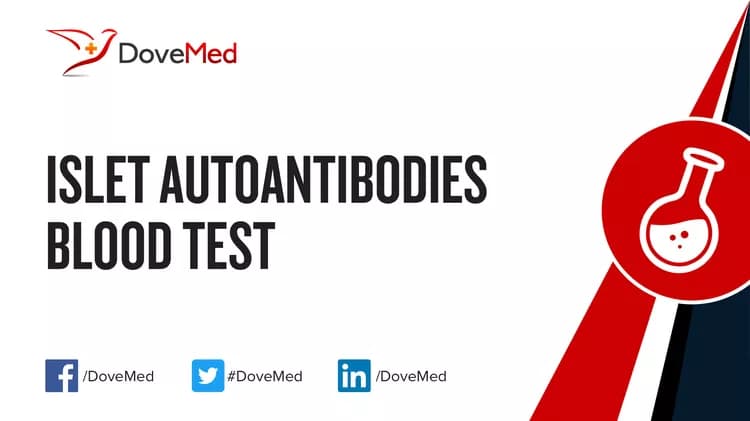What are other Names for this Test? (Equivalent Terms)
- Diabetes-Related Autoantibodies Blood Test
- IAA Blood Test
What is Islet Autoantibodies Blood Test? (Background Information)
- Islet autoantibodies are defense proteins associated with type I diabetes. Some islet autoantibodies target and destroy the insulin-producing cells, which causes type I diabetes
- Insulin is a hormone that causes cells to take in glucose. This leads to a reduction of glucose in the blood. Individuals with diabetes mellitus, or simply “diabetes”, experience difficulties regulating their blood sugar because of problems with insulin production or sensitivity
- There are 3 types of diabetes mellitus, all of which stem from problems with insulin function:
- Type 1, or insulin-dependent, diabetes results from the autoimmune destruction of beta cells of the pancreas
- Type 2, or insulin-independent, diabetes results from the desensitization of cells to the effects of insulin
- Gestational diabetes may occur during pregnancy and result in excessively large babies that exhibit low glucose levels
- Islet autoantibodies are associated with type 1 diabetes. Islet autoantibodies are defense proteins that mistakenly target and destroy the beta cells, impairing the body’s ability to produce insulin
- The Islet Autoantibodies Blood Test detects autoantibodies formed against the islet cells of the pancreas, which are circulating in blood. It is used to distinguish between the different types of diabetes in cases where diabetes is suspected
- The different types of islet autoantibodies include:
- Glutamic acid decarboxylase autoantibodies
- Islet cell cytoplasmic autoantibodies
- Insulin autoantibodies
- Insulinoma-2 associated autoantibodies (IA-2A)
What are the Clinical Indications for performing the Islet Autoantibodies Blood Test?
Following are the clinical indicators for performing the Islet Autoantibodies Blood Test:
- Differentiating between diabetes mellitus types 1, 2, and 3
- Evaluating diabetics with insulin resistance
- Family history of diabetes
- Following up to findings of low blood sugar in nondiabetic individuals
How is the Specimen Collected for Islet Autoantibodies Blood Test?
Following is the specimen collection process for Islet Autoantibodies Blood Test:
Sample required: Blood
Process of obtaining a blood sample in adults:
- A band is wrapped around the arm, 3-4 inches above the collection site (superficial vein that lies within the elbow pit)
- The site is cleaned with 70% alcohol in an outward spiral, away from the zone of needle insertion
- The needle cap is removed and is held in line with the vein, pulling the skin tight
- With a small and quick thrust, the vein is penetrated using the needle
- The required amount of blood sample is collected by pulling the plunger of the syringe out slowly
- The wrap band is removed, gauze is placed on the collection site, and the needle is removed
- The blood is immediately transferred into the blood container, which has the appropriate preservative/clot activator/anti-coagulant
- The syringe and the needle are disposed into the appropriate “sharp container” for safe and hygienic disposal
Preparation required: No special preparation is needed prior to the test.
What is the Significance of the Islet Autoantibodies Blood Test Result?
Detection of islet cell autoantibodies by the Islet Autoantibodies Blood Test indicates a positive value. A positive value for the Islet Autoantibodies Blood Test may point to a diagnosis of type 1 diabetes.
The various islet autoantibodies occur in individuals with type 1 diabetes in the following frequencies:
- Glutamic acid decarboxylase autoantibodies: 70-80%
- Islet cell cytoplasmic autoantibodies: 70-80%
- Insulin autoantibodies: Less than 10% in adults and around 60% in children
- Insulinoma-2 associated autoantibodies (IA-2A): Greater than 60%
The laboratory test results are NOT to be interpreted as results of a "stand-alone" test. The test results have to be interpreted after correlating with suitable clinical findings and additional supplemental tests/information. Your healthcare providers will explain the meaning of your tests results, based on the overall clinical scenario.
Additional and Relevant Useful Information:
- As opposed to diabetes mellitus, which is the most common cause of high blood sugar, diabetes insipidus is a rare disorder whereby the kidneys lose the ability to conserve water
Certain medications that you may be currently taking may influence the outcome of the test. Hence, it is important to inform your healthcare provider, the complete list of medications (including any herbal supplements) you are currently taking. This will help the healthcare provider interpret your test results more accurately and avoid unnecessary chances of a misdiagnosis.
The following DoveMed website link is a useful resource for additional information:
http://www.dovemed.com/common-procedures/procedures-laboratory/glucose-blood-test/
http://www.dovemed.com/diabetes-related-autoantibodies-blood-test/
Please visit our Laboratory Procedures Center for more physician-approved health information:
http://www.dovemed.com/common-procedures/procedures-laboratory/
Related Articles
Test Your Knowledge
Asked by users
Related Centers
Related Specialties
Related Physicians
Related Procedures
Related Resources
Join DoveHubs
and connect with fellow professionals


0 Comments
Please log in to post a comment.